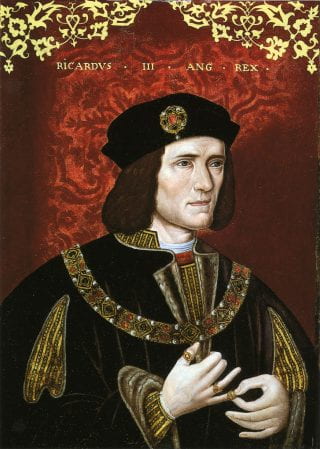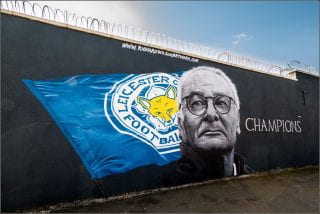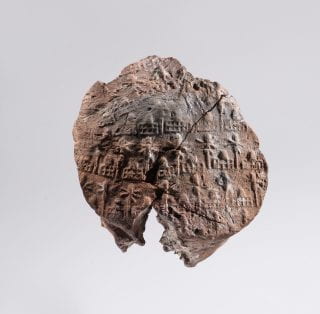By Laurent Bellaiche and Daniel Kennefick
Richard III, King of England, died in August 1485 at the Battle of Bosworth Field, which was the decisive battle that concluded the Wars of the Roses. Strikingly, his remains were lost for more than 500 years, until they were discovered in 2012 under a car park in Leicester. After careful checking that the remains unearthed were indeed those of the late Plantagenet monarch, the question then arose of where they should be reburied. Would it be at York Minster as some Plantagenet descendants claimed he would have wished? Or should it rather be at Leicester Cathedral, given their original interment in one of the city’s friaries? After a court decision, these remains were carried in procession to Leicester Cathedral in March 2015 and reburied there.
And from that moment on, miracles happened for Leicester’s football team, the Foxes. As a matter of fact, they began immediately when Leicester City won seven of its last nine games in the English Premier League (EPL) to escape relegation to the football championship at the end of 2014-2015 season. The team had been hotly fancied for such a relegation, and their performance at the end of that season is still regarded as one of the great escape acts of English football history. An even more dramatic fairy tale transpired the following season, which saw one of the biggest surprises in the history of football: Leicester City became champions of England ahead of Arsenal, with no less than a 10-point difference, leaving famous clubs like Tottenham, Manchester City and Manchester United in their wake in the remainder of the top 5 placings at season’s end. Not only had Leicester never won a league title before, their only previous successes had been in the relatively lightly regarded League Cup competition. Despite being the nursery for famous players like Gary Lineker, Peter Shilton and Gordon Banks, the team had rarely threatened the upper reaches of the League table. In recent years they had, after a brief period of success under Irish manager Martin O’Neill, plumbed new depths, even being relegated to the third tier of the league system in 2008. They had, until then, been one of a handful of clubs who had never fallen below the second tier. So recent was this ignominy that some of their championship squad had played with them in League One, including Andy King, a midfield stalwart with the unusual distinction of winning three different divisions with the same club.
Other players’ careers matched the fairytale manner of the club’s own fortunes. Jamie Vardy scored 24 goals for the Foxes that 2015-2016 season and won the 2016 FWA Player of the Year award. He had joined the club a few years before after five years playing non-league football. His teammate Riyad Mahrez had a tally of 17 goals and received the PFA Player of the Year’s trophy. Mahrez was signed by Leicester from a team playing in the French Ligue 2. He knew so little about Leicester City Football Club that he initially thought he had been mistakenly approached by the city’s much more famous rugby club. N’Golo Kanté, another recent denizen of France’s second tier, who anchored Leicester’s midfield in their championship season, would win both the FWA Player of the Year and the PFA Player of the Year, admittedly one year later and wearing a different blue jersey, namely that of Chelsea. The Leicester team during this triumphal 2015-2016 season was managed by an Italian coach, Claudio Ranieri. The extent of his popularity in Leicester and the adulation with which their fans regard him can be measured by the following anecdote: a Scottish lookalike of Ranieri arrived in Leicester just after the title and took advantage of such resemblance to have numerous affairs with the presumably football-fancying women of Leicester. This lookalike was then arrested by the police for impersonation but countered that he never said that he was Claudio Ranieri. The police then invited him to answer a simple question: “but why then did you pretend to speak English with an Italian accent?’’ It’s a fair cop, guv.
Leicester’s good fortune continued the following season in the 2016-2017 Champions League, in what was naturally their first appearance in Europe’s premier competition for club teams. The Foxes finished first in their group ahead of Porto, Copenhagen and Bruges, teams with many decades of experience in major European competitions. During this group stage, Leicester won four games out of the six, drew one game and only lost to Porto in the last game of the group (albeit a 5-0 defeat, but with no consequence either for qualification to the knockout stages of the competition, or for their top ranking in the draw for those rounds). The Foxes then knocked out the previous winner of the Europe League, Sevilla FC, in the round of 16. A 2-1 first-leg defeat in Andalusia was followed by a 2-0 victory with goals from Morgan and Albrighton at the King Power Stadium. This new stadium, completed in this century to replace the team’s traditional ground at Filbert Street, rejoices in a name which appears to pay fitting tribute to Richard III, known as an unscrupulous man who usurped the throne of England from his own nephews. Leicester then fell in the quarter-final against another Spanish club, the giant Atlético Madrid. The Frenchman Griezmann scored the only goal of the match for the Colchoneros in the first leg at the Vincente Calderón stadium, and, in the second leg, Leicester was only able to secure a 1-1 draw on home turf, thanks to a strike from the irrepressible Jamie Vardy.
Leicester City still appeared to be under the protection of King Richard III when they won the 2020-2021 FA Cup. They successively eliminated Stoke City, Brentford, Brighton and Hove Albion, Manchester United and Southampton to reach the final against Chelsea. Tielemans then scored the single goal of that final held at the Wembley cathedral to secure the only FA Cup ever won by the Foxes in their 139 year-existence. Chelsea would console themselves by winning the Champions League that year. King Richard III thus allowed Leicester to beat the soon to be King of Europe at Wembley in 2021.
The following 2021-2022 season saw Leicester City shining again in Europe, where they competed for the UEFA Europa Conference League. The Danish team of Randers, the French club of Rennes and even the Dutch giant of PSV Eindhoven could not put a stop to the Foxes’ run (Leicester City take their nickname from Leicestershire’s traditional association with the sport of foxhunting). However, the little team from the heart of England met their match in the semi-finals, in the form of a team from the center of another former global empire. AS Roma, under the leadership of the “Special One’’, José Mourinho, held their opponents to a 1-1 draw in Leicester before winning the return match 1-0 in the Eternal City. This Roma, led by a man with an ego worthy of a Plantagenet, were subsequently crowned in Tirana, Albania, by winning the 2021-2022 UEFA Europa Conference League against the Feyenoord from the Netherlands.
Fast forward to the recent past and, more precisely, to the last day of the EPL 2022-2023 season on Sunday, May 28, 2023. In light of all these previous brilliant events and achievements, the Leicester fans could only be optimistic that the remains of King Richard III would retain their miraculous power, like the relic of some sort of medieval anti-saint, and save Leicester from relegation. It would be Leeds going down, as well as an Everton team which would see its 69 year-run in the top-flight of English football coming to an end. Working-class cities are obviously no match for royalty, are they not? That day, Leeds lost 4-1 at home against Tottenham, which indeed resulted in its relegation. However, Ô rage Ô désespoir, Everton won 1-0 at home against Bournemouth. Leicester’s 2-1 victory against West Ham was therefore futile and the Foxes will play next year in the Championship.
How to understand such ignominy? How came the magical touch of Richard III to fail at last on that critical Sunday? Could it be that Liverpool, home to Everton F. C., has acquired human remains that are even more powerful than those of King Richard III? Indeed, beloved readers. The Garstang Museum in Liverpool hosts many artifacts from the tomb of an Egyptian woman who died over 5,000 years ago. Her name? Queen Neithhotep, who is supposedly the earliest known female monarch in history, thought to have been the wife of Narmer of Menes, who founded Egypt’s first dynasty. Surely the first queen of history’s first dynasty outranks a usurping member of England’s Plantagenet dynasty whose reign lasted a bare two years before he was abandoned by his allies and met inglorious defeat in battle.
Are there any football clubs inclined to pressure their local municipality into acquiring the remains of an ancient but high-profile potentate? Those thinking of giving it a miss should consider what happened to York City football club after it was decided that the remains of Richard of Gloucester should be reburied at Leicester Cathedral in 2015 rather than at York Minster. The answer is stark in its simplicity: in 2015-2016, while Leicester City was winning the EPL, York City finished last in League Two and lost their football league status, which they have not regained up to this day. If only York had had the idea of bringing Neith-Hotep to their city! Time for aspiring or relegation haunted clubs to consider financing archaeological expeditions to ancient tombs? With smaller clubs in need of a miracle to keep up with petrodollar powered superclubs, don’t bet against it. Maybe Genghis Khan had the right idea when he insisted that no one should mark the location of his final resting place.
Laurent Bellaiche is a Distinguished Professor in the Physics Department and Institute for Nanoscience and Engineering, as well as the Twenty-First Century Endowed Professor in Optics, Nanoscience and Science Education (for more details, please see: ccmp.uark.edu). His favorite team is Paris Saint-Germain, especially that of the first trophies (French Cups) in the 1980’s, with the three Dominique’s (Baratelli, Bathenay and Rocheteau) and two jewels (Safet Susic and Mustapha Dahleb). His two favorite male football players of all time are Diego Armando Maradona and Robby Rensenbrink. His current three favorite female players are Grace Geyoro, Melchie Dumornay and, of course, Sophia Smith. His favorite soccer/football quote is one from Bill Shankly, “Some people think football is a matter of life and death – I assure you, it’s much more important than that.”
Daniel Kennefick is a physicist at the U of A studying gravitational waves and galactic structure. He is the author of three books on the history of science “Traveling at the Speed of Thought,” “An Einstein Encyclopedia” and “No Shadow of a Doubt,” all from Princeton University Press. Growing up in a sporting family in Ireland he has been a passionate supporter of various forms of football, and other sports, from a young age. He has several family members who were well known players of hurling, gaelic football and rugby. In soccer terms he began supporting Liverpool at a young age, attracted by their winger, Steve Heighway, who played internationally for Ireland. His family emigrated to Canada when he was in grade school, and he can remember going to see the great Pele play for the New York Cosmos against local team Toronto Metro-Croatia. He returned to Ireland after a few years and his chief sporting passion as a teenager and since is Track and Field, both as participant and spectator. He scored brownie points when meeting his future wife and being told she attended the University of Arkansas and he was able to say not “where is Arkansas?” but “oh, that’s where all the (Irish) runners go!”



